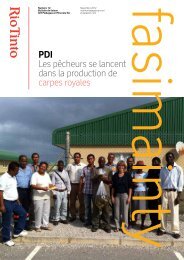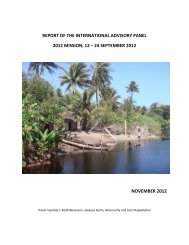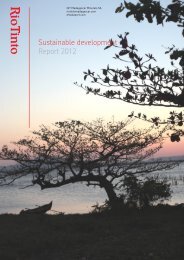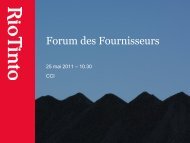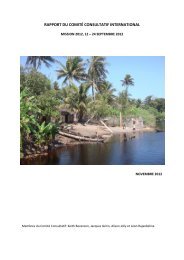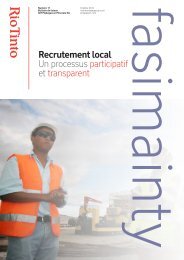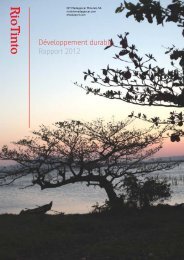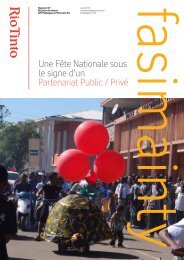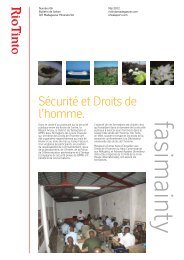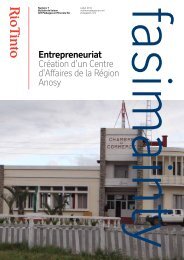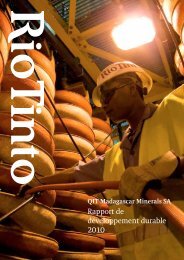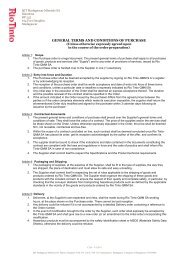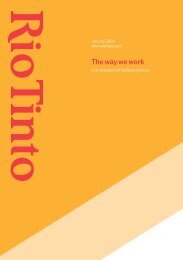Tracking Development - Rio Tinto - Qit Madagascar Minerals
Tracking Development - Rio Tinto - Qit Madagascar Minerals
Tracking Development - Rio Tinto - Qit Madagascar Minerals
Create successful ePaper yourself
Turn your PDF publications into a flip-book with our unique Google optimized e-Paper software.
executive summary<br />
direct discourse, public consultations were widely held with<br />
interested and affected parties at the local, regional, national<br />
and international level beginning in 1998. Recognising<br />
sustainable socioeconomic and environmental benefits<br />
could flow from QMM investment only if it was part of a<br />
long-term regional development strategy, the project was<br />
designed to function as part of a multi-partnership effort<br />
involving government officials, civil society organisations,<br />
international donor agencies and the private sector. Special<br />
attention was paid to integrating the project in a regional<br />
development context. QMM sponsored a far-reaching Plan<br />
de Développement Régional (PDR, or Regional <strong>Development</strong><br />
Plan) and the Comité Régional de Développement (CRD,<br />
or Regional <strong>Development</strong> Committee) was formed to lead<br />
the planning process. Alliances were forged with key actors<br />
working in the region, including the United States Agency for<br />
International <strong>Development</strong> (USAID) and the World Bank.<br />
(see The Exploration & study Phase, p. 12-23.)<br />
In late 2006, the project entered its initial construction<br />
phase at the first mining site of Mandena. The first and<br />
single largest industrial development project ever carried<br />
out in <strong>Madagascar</strong>, investment totalled US$931 million, with<br />
US$675 million going towards mining infrastructures and<br />
US$256 million towards the establishment of the new Port<br />
of Ehoala. The construction phase spanned three years and<br />
brought about rapid and drastic change to the Anosy region.<br />
An unprecedented level of economic activity was generated,<br />
directly creating approximately 4,500 jobs, while indirectly<br />
inducing up to three times as many jobs. The sudden<br />
intensity in economic activity also caused inflation, especially<br />
evident in the price of housing and food commodities,<br />
which in turn impacted most heavily on the very poor.<br />
Measures were taken to mitigate impacts, including the<br />
supply management of rice, <strong>Madagascar</strong>’s staple crop, and<br />
price monitoring of other major commodities. Additionally,<br />
mass sensitisation and awareness campaigns were organised<br />
to convey prevention messages about HIV/AIDS. As some<br />
of the infrastructures necessitated the resettlement of local<br />
communities, a programme benefiting Persons Affected by<br />
the Project (PAPs) was implemented focusing on livelihood<br />
restoration and development. (See The Construction<br />
Phase, p. 24-33.)<br />
QMM’s investments are those of a socially responsible<br />
enterprise. Numerous initiatives encompassing health,<br />
education, economic empowerment, good governance,<br />
sustainable development and natural resource management<br />
are currently being carried out.<br />
Whether at the workplace or in the communities with<br />
which QMM is involved, activities involving health promotion<br />
are of paramount importance to the company. The fight<br />
against HIV/AIDS and sexually transmitted infections<br />
(STIs) has been a cornerstone of QMM’s interventions in<br />
the Fort Dauphin area. Condoms, as well as Information,<br />
Education and Communication (IEC) materials, are always<br />
readily accessible and available to employees across all sites.<br />
Wellness campaigns, in which volunteer peer educators<br />
sensitise target populations on key health issues such as<br />
HIV, STIs, malaria and diarrhoeal diseases, while distributing<br />
condoms, chlorine solution (Sur Eau) and mosquito nets,<br />
are frequently sponsored by QMM. Water wells and health<br />
centres have been installed and constructed in communities<br />
previously without these basic facilities. Acknowledging the<br />
importance of maternal and child health, QMM finances a<br />
mother and child health programme and is an active partner<br />
with the Ministry of Health in the biannual and nationwide<br />
Mother and Child Health Week. (See The Production<br />
Phase, Supporting a Healthy Community, p. 36-37.)<br />
7


